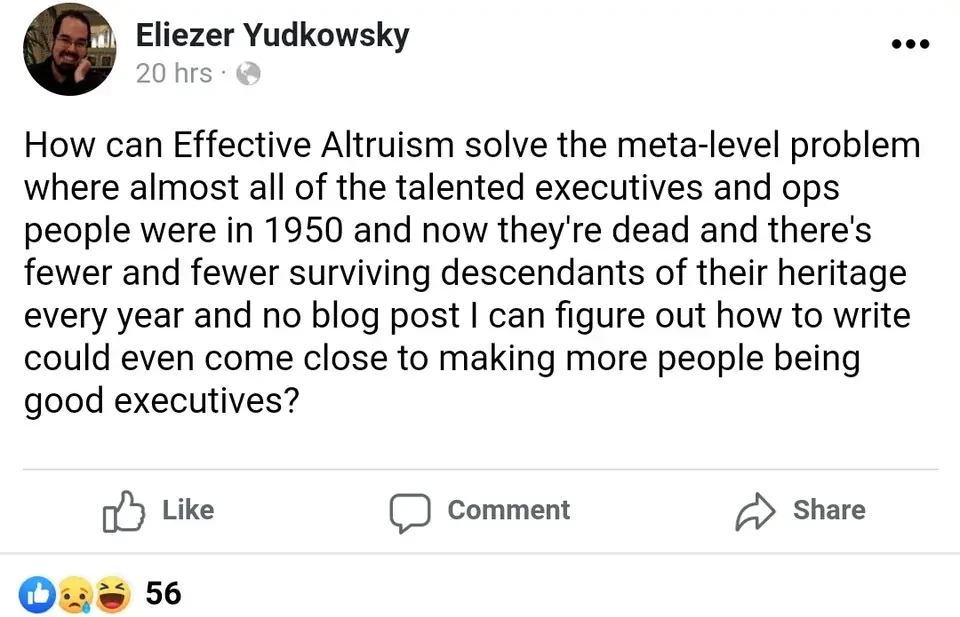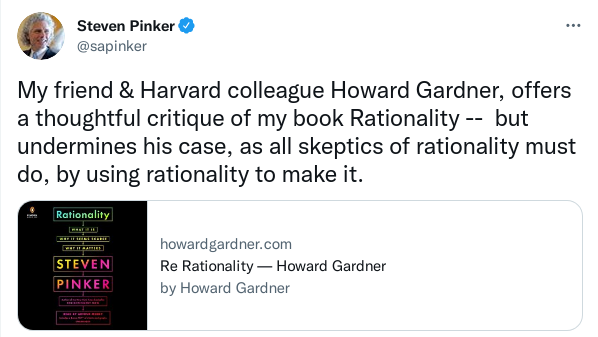In the far-off days of August 2022, Yudkowsky said of his brainchild,
If you think you can point to an unnecessary sentence within it, go ahead and try. Having a long story isn't the same fundamental kind of issue as having an extra sentence.
To which MarxBroshevik replied,
The first two sentences have a weird contradiction:
Every inch of wall space is covered by a bookcase. Each bookcase has six shelves, going almost to the ceiling.
So is it "every inch", or are the bookshelves going "almost" to the ceiling? Can't be both.
I've not read further than the first paragraph so there's probably other mistakes in the book too. There's kind of other 'mistakes' even in the first paragraph, not logical mistakes as such, just as an editor I would have... questions.
And I elaborated:
I'm not one to complain about the passive voice every time I see it. Like all matters of style, it's a choice that depends upon the tone the author desires, the point the author wishes to emphasize, even the way a character would speak. ("Oh, his throat was cut," Holmes concurred, "but not by his own hand.") Here, it contributes to a staid feeling. It emphasizes the walls and the shelves, not the books. This is all wrong for a story that is supposed to be about the pleasures of learning, a story whose main character can't walk past a bookstore without going in. Moreover, the instigating conceit of the fanfic is that their love of learning was nurtured, rather than neglected. Imagine that character, their family, their family home, and step into their library. What do you see?
Books — every wall, books to the ceiling.
Bam, done.
This is the living-room of the house occupied by the eminent Professor Michael Verres-Evans,
Calling a character "the eminent Professor" feels uncomfortably Dan Brown.
and his wife, Mrs. Petunia Evans-Verres, and their adopted son, Harry James Potter-Evans-Verres.
I hate the kid already.
And he said he wanted children, and that his first son would be named Dudley. And I thought to myself, what kind of parent names their child Dudley Dursley?
Congratulations, you've noticed the name in a children's book that was invented to sound stodgy and unpleasant. (In The Chocolate Factory of Rationality, a character asks "What kind of a name is 'Wonka' anyway?") And somehow you're trying to prove your cleverness and superiority over canon by mocking the name that was invented for children to mock. Of course, the Dursleys were also the start of Rowling using "physically unsightly by her standards" to indicate "morally evil", so joining in with that mockery feels ... It's aged badly, to be generous.
Also, is it just the people I know, or does having a name picked out for a child that far in advance seem a bit unusual? Is "Dudley" a name with history in his family — the father he honored but never really knew? His grandfather who died in the War? If you want to tell a grown-up story, where people aren't just named the way they are because those are names for children to laugh at, then you have to play by grown-up rules of characterization.
The whole stretch with Harry pointing out they can ask for a demonstration of magic is too long. Asking for proof is the obvious move, but it's presented as something only Harry is clever enough to think of, and as the end of a logic chain.
"Mum, your parents didn't have magic, did they?" [...] "Then no one in your family knew about magic when Lily got her letter. [...] If it's true, we can just get a Hogwarts professor here and see the magic for ourselves, and Dad will admit that it's true. And if not, then Mum will admit that it's false. That's what the experimental method is for, so that we don't have to resolve things just by arguing."
Jesus, this kid goes around with L's theme from Death Note playing in his head whenever he pours a bowl of breakfast crunchies.
Always Harry had been encouraged to study whatever caught his attention, bought all the books that caught his fancy, sponsored in whatever maths or science competitions he entered. He was given anything reasonable that he wanted, except, maybe, the slightest shred of respect.
Oh, sod off, you entitled little twit; the chip on your shoulder is bigger than you are. Your parents buy you college textbooks on physics instead of coloring books about rocketships, and you think you don't get respect? Because your adoptive father is incredulous about the existence of, let me check my notes here, literal magic? You know, the thing which would upend the body of known science, as you will yourself expound at great length.
"Mum," Harry said. "If you want to win this argument with Dad, look in chapter two of the first book of the Feynman Lectures on Physics.
Wesley Crusher would shove this kid into a locker.



There might be enough point-and-laugh material to merit a post (also this came in at the tail end of the week's Stubsack).